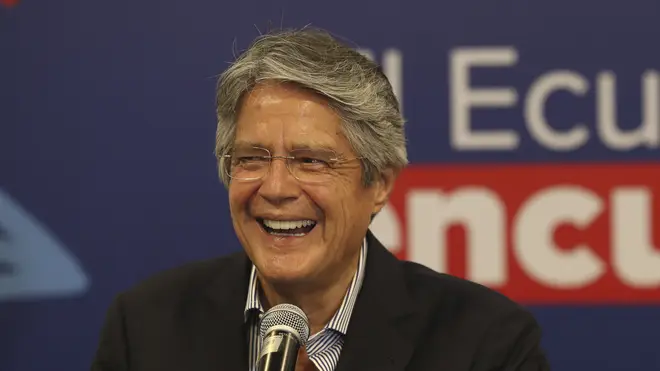
Shelagh Fogarty 1pm - 4pm
13 April 2021, 04:34

But neighbouring Peru’s presidential contest is headed to a run-off.
Ecuador will be led for the next four years by conservative businessman Guillermo Lasso after voters rebuffed a left-leaning movement that yielded an economic boom then a recession during a decade in power.
Sunday’s election certainty did not extend to neighbouring Peru, where the presidential contest is headed to a run-off after none of the 18 candidates obtained more than 50% of the votes. Peru did, however, elect a new congress.
The South American nations held elections under strict public health measures amid a surging coronavirus pandemic that has brought on new lockdowns and exacerbated a general sense of fatigue.

Mr Lasso’s victory in Ecuador came after less than half of a percentage point put him ahead of another candidate and allowed him to claim a spot in Sunday’s run-off.
The result breaks off the country’s years under the so-called Correismo, a movement labelled after former President Rafael Correa who governed Ecuador from 2007 through 2017.
Mr Correa grew increasingly authoritarian in the latter years of his presidency and was sentenced to prison last year in a corruption scandal.
His protege, Andres Arauz, easily advanced to the contest to replace President Lenin Moreno, who chose not to seek re-election.
Mr Moreno was also an ally of Mr Correa but turned against him while in office.
In the run-off, Mr Lasso benefitted from the discontent toward Mr Correa and his allies, but he will have face a strong Correista bloc in congress.

“He did not speak for all audiences … for the entire population, and he could not respond to human rights accusations of the Correista era.”
Mr Correa governed as an ally of Cuba’s Fidel Castro and Venezuela’s Hugo Chavez. He oversaw a period of economic growth driven by an oil boom and loans from China that allowed him to expand social programmes, build roads and schools and pursue other projects.
But Mr Correa increasingly cracked down on opponents, the press and businesses during his latter stage in office, and feuded with Indigenous groups over development projects.
Ecuador also hit an economic slowdown in 2015, largely driven by the drop in oil prices.
Mr Lasso finished second in the previous two presidential contests. He favours free-market policies and Ecuador’s rapprochement with international organisations.
During the campaign, he proposed raising the minimum wage, finding ways to include more youth and women in the labour market and eliminating tariffs for agricultural equipment.

“The first action will be to put the economy in order, promote investment and generate employment so that all Ecuadorians do not emigrate, stay in Ecuador and achieve the dreams they want for their families here,” Mr Lasso said at a press conference Monday.
He said his immigration policy is two-fold: Defending Ecuadorians abroad “but at the same time, also acting humanely with Venezuelans who have arrived in Ecuador. … We cannot be so inconsistent in asking for a good treatment for Ecuadorians living abroad and mistreating foreigners living in Ecuador; we have to be coherent”, he said, adding his government will seek to work with the United Nations.
Ecuador is among the countries that have seen an influx of Venezuelan immigrants who have left their troubled nation in search of better opportunities.
Ecuador is deep in a recession that many fear will worsen as lockdowns return because of a spike in Covid-19 cases.
Ecuador has tallied more than 344,000 cases and over 17,200 deaths as of Sunday, according to data from Johns Hopkins University in the US.